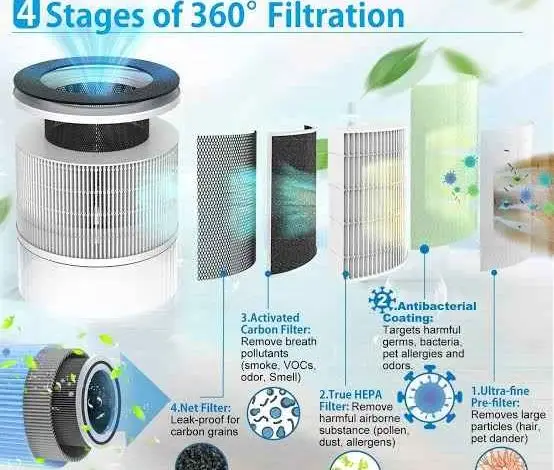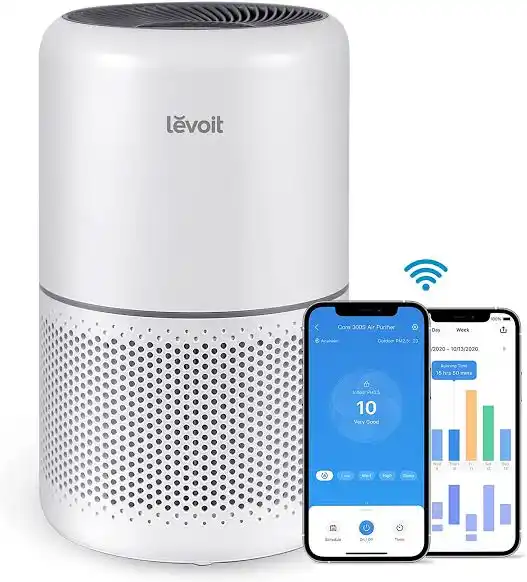How Long Do Air Purifier Filters Last?

Air purifiers play a vital role in improving indoor air quality, safeguarding you from pollutants, allergens, and harmful particles. But to ensure these devices work efficiently, the filters inside them must be maintained and replaced at the right intervals. Neglecting them can mean inhaling air that’s not as clean as you think.
So, how long do air purifier filters actually last? In this comprehensive guide, we’ll explore their lifespan, factors affecting durability, and tips to extend their usability.
If you’ve ever wondered whether your air purifier is working as it should or whether it’s time to change its filters, this article has all the answers you need.
What Determines the Lifespan of Air Purifier Filters?

The lifespan of an air purifier filter is influenced by several factors, each playing a significant role in how long it will remain effective. Here are the key elements that determine the durability of your air purifier filters:
1. Frequency of Usage
The more frequently you use your air purifier, the faster the filters wear out. Running it 24/7 will naturally result in quicker replacement needs compared to occasional usage. For homes in areas with high air pollution, constant operation is often unavoidable.
2. Type of Filter
Different filters are designed for specific purposes, and their lifespans vary accordingly:
- HEPA filters, for example, are excellent for capturing microscopic particles but require replacement every 6–12 months.
- Activated carbon filters, used to eliminate odors and VOCs, generally last 3–6 months.
- Washable filters, while reusable, need consistent cleaning and may degrade after a few years.
3. Indoor Air Quality
If your home is filled with dust, pet dander, smoke, or pollen, the filters will clog more quickly. Urban areas or homes with smokers, pets, or cooking odors expose filters to higher pollutant levels, shortening their lifespan.
4. Maintenance Practices
Regular cleaning and proper maintenance can significantly extend the lifespan of filters. Washable filters, in particular, benefit from routine washing, while pre-filters should be vacuumed frequently to prevent larger particles from reaching the primary filter.
5. Environmental Factors
Living near industrial areas or in cities with high pollution levels means your filters will be subjected to more contaminants. Similarly, during pollen-heavy seasons like spring, filters tend to wear out faster.
How Long Do Different Types of Air Purifier Filters Last?

Understanding the lifespan of each filter type can help you plan better and maintain your air purifier effectively.
1. Lifespan of HEPA Filters
HEPA (High-Efficiency Particulate Air) filters are the gold standard for trapping allergens like pollen, mold spores, and dust mites. On average, they last between 6 and 12 months, depending on usage and air quality.
- When to Replace: If you notice reduced airflow, dust accumulating on surfaces faster than usual, or worsening allergy symptoms, it’s time to replace the HEPA filter.
- Pro Tip: Consider buying certified HEPA filters from reputable brands to ensure longevity and efficiency.
2. How Long Do Carbon Filters Last?
Carbon filters are specially designed to absorb odors, smoke, and VOCs, making them ideal for kitchens, homes with smokers, or areas prone to chemical smells. These filters generally last 3 to 6 months, but heavy usage can reduce their lifespan.
- When to Replace: Persistent odors that linger even after running the purifier indicate a saturated carbon filter.
3. How Long Do Washable Air Filters Last?
Washable or reusable filters, often made of durable materials like aluminum or plastic, can last several years with proper care. However, their effectiveness diminishes over time. Regular cleaning every 1 to 2 weeks is essential to maintain optimal performance.
- Pro Tip: Always dry washable filters thoroughly after cleaning to prevent mold growth.
Signs It’s Time to Replace Air Purifier Filters

Knowing the signs of a worn-out filter ensures your air purifier performs at its best. Here’s how to know when it’s time for a change:
- Visible Dirt or Discoloration: A clogged filter with visible dust or discoloration is a clear indicator it needs replacing.
- Reduced Airflow: If the purifier isn’t pushing out as much air as it used to, the filter might be clogged.
- Persistent Odors: Lingering smells in your home suggest the carbon filter has lost its effectiveness.
- Increased Allergy Symptoms: If sneezing, coughing, or nasal congestion returns despite using the purifier, the filter may no longer be capturing allergens effectively.
- Noisy Operation: A dirty filter can strain the purifier’s motor, resulting in unusual sounds.
Ignoring these signs and Keeping filters too long can compromise the air purifier’s efficiency and may even damage the device.
How to Extend the Lifespan of Air Purifier Filters

While all filters eventually need replacing, proper care can help extend their lifespan, saving you money in the long run.
1. Regular Maintenance
- Clean washable filters frequently using water and mild soap.
- Vacuum pre-filters every 1–2 weeks to prevent larger particles from reaching the main filter.
- Wipe down the exterior of the purifier to reduce dust accumulation.
2. Placement of the Air Purifier
Position your air purifier in areas with lower levels of pollutants and away from heavy-use areas like kitchens or entryways to reduce exposure to grease and dirt.
3. Use of Pre-Filters
Pre-filters catch larger particles like pet hair and dust, protecting the main filter from clogging. Regularly cleaning or replacing pre-filters can extend the lifespan of HEPA and carbon filters.
Air Purifier Maintenance Schedule

Following a strict maintenance schedule ensures your purifier operates efficiently:
- HEPA Filters: Replace every 6–12 months.
- Carbon Filters: Replace every 3–6 months.
- Washable Filters: Clean every 1–2 weeks, and replace after a few years if performance declines.
Scheduling reminders for filter maintenance can help you stay on track.
Common Myths About Air Purifier Filter Lifespan

Let’s debunk some misconceptions:
- Myth: All filters last the same amount of time.
Reality: Filter lifespans vary based on type, usage, and environmental conditions. - Myth: Washable filters last forever.
Reality: Although reusable, washable filters degrade over time and need replacement after prolonged use. - Myth: You can ignore manufacturer recommendations.
Reality: Skipping maintenance can reduce the purifier’s efficiency and even damage it over time.
Why Regular Filter Replacement is Worth It

Investing in filter replacements ensures cleaner air and better performance. Worn-out filters can allow pollutants to circulate, reducing the purifier’s effectiveness. Benefits of timely replacement include:
- Improved Health: Clean filters capture allergens and pollutants, reducing respiratory issues.
- Efficient Operation: A well-maintained purifier uses less energy and lasts longer.
- Cost Savings: Prevent costly repairs by replacing filters on time.
Comparing Filter Types and Lifespans
Here’s a quick breakdown of filter types and their average lifespans:
| Filter Type | Lifespan | Best For |
|---|---|---|
| HEPA Filters | 6–12 months | Allergens, dust, and mold |
| Carbon Filters | 3–6 months | Odors, smoke, and VOCs |
| Washable Filters | Several years (if cleaned) | Large particles and dust |
Use this table as a quick reference to choose and maintain the right filter for your needs.
Conclusion
Your air purifier is a key component of a healthy indoor environment, but it’s only as effective as the filters inside it. Regularly maintaining and replacing filters ensures optimal performance and better air quality for your home.
Now that you know how long air purifier filters last and how to extend their lifespan, why not do the needful today? Check your filters, follow a maintenance schedule, and breathe easier knowing your air purifier is working at its best.
